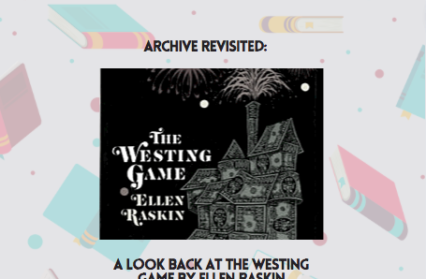2022 marks ten years since the launch of Wales Arts Review, and as part of our celebrations, throughout this year we’ll be revisiting some of the best and most loved features, interviews, and reviews from our archive of nearly five thousand published pieces.
Today we revisit a piece from BJ. Epstein who, in 2014, wrote about The Westing Game by Ellen Raskin, a work of children’s literature which won the Newbery Medal following its publication in 1978.
*
182 pp., New York: Puffin, 1978
Thirty-five years ago, Ellen Raskin’s novel The Westing Game won the Newbery Medal. The book is still in print, and it was made into a play and film, and it is still read both by children and adults, so this leads to the obvious question of ‘why?’ What is it about this book that spoke to the Newbery committee all those years ago and what is it that continues to appeal to readers today?
In the novel, wealthy industrialist Sam Westing dies, and his will calls for his ‘heirs’ (not relatives but rather a bunch of people whose lives he touched for better or for worse) to meet at his mansion. His will sets out a ‘game’: in this game, the heirs are paired up and each pair is given a set of clues and $10,000. With the money and the hints, they are to find out who killed Westing and why. He closes his list of instructions by noting, ‘Senseless, you say? Death is senseless yet it makes way for the living. Life, too, is senseless unless you know who you are, what you want, and which way the wind blows…God bless you all and remember this: Buy Westing Paper Products!’ This captures the tone of the book; the story is both serious and wryly humorous, both philosophical and practical.
The Westing Game is nominally a children’s book (publisher Puffin notes on the back that it is for ‘ages 10 up’). Yes, some of the main characters are children – plaited Turtle, track star Doug, wannabe-writer Theo, and Theo’s disabled but bright, bird-watching brother Chris – but equally, many of the main characters are adults, including the parents of these young people, along with a judge, a podiatrist, a religious cleaning woman, a delivery boy, a secretary, and more. For this reason, and for thematic reasons too, the book feels as though it could be for an audience of just about any age.
Raskin’s book is a mystery, and the writing is so engaging that the reader wants to keep reading in order to find out what is happening. But this is not a generic thriller. What sets this book apart and what keeps it popular is its treatment of the characters, and its apparent commitment to the development of a diverse cast.
Despite being written in a time before feminism and multiculturalism really began to influence the world of literature, especially children’s literature, Raskin shows a range of personalities and experiences, and she subtly argues against racist, xenophobic, and misogynistic views.
For example, James Hoo and his Chinese immigrant wife run a Chinese restaurant. Some of the other characters seem suspicious of this ‘Oriental’ cuisine and of Madame Hoo with her poor English skills, and they employ stereotyped language to describe her, seeming to find Madame Hoo exotic, mysterious, and passive. Judge Josie-Jo Ford is a black woman from a working-class background who has had to work hard and to make sacrifices to have achieved this level of success, but her sophistication and brains make the others dismiss her as cold, as though she has gotten above her station. Turtle Wexler is highly intelligent, but she is the ignored, almost unloved little sister in the family; her beautiful, supposedly perfect sister Angela gets all their mother’s attention and admiration, and Turtle has to struggle against the idea that women are there only to be looked at. Raskin mocks all the old-fashioned ideas that are implicit in these characters’ lives; she questions, and forces the reader to question, why we should be surprised that a black woman from a poor family would become a high-powered figure, or why we are unwelcoming towards immigrants, or patronising towards the disabled, or frightened and challenged by smart females. She lets the characters develop, to learn from their mistakes, and to not be shaped solely by beliefs about who and what they should be. And because of that, those who hold stereotyped or racist views are likewise encouraged to grow and to change.
Ultimately, although the story is an exciting who-done-it, the emphasis on the ‘who’ is what keeps readers coming back. The characters make the story interesting, and they make the reader think, and that is exactly what a powerful book should do.
BJ. Epstein’s ‘A Look Back at The Westing Game by Ellen Raskin’ was first published by Wales Arts Review in 2014.











